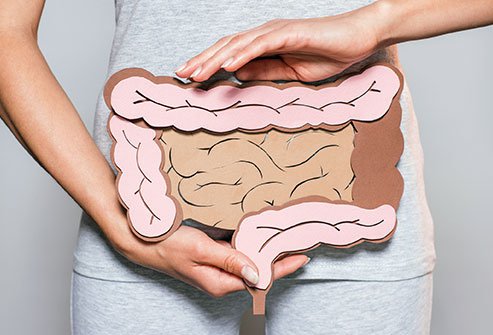
Bowel incontinence is the inability to control bowel movements that results in involuntary bowel movements (fecal elimination). This can range from an infrequent involuntary passage of small amounts of stool to a total loss of bowel control.
It’s a common problem, especially among older adults.
Accidental bowel leakage is usually not a serious medical problem. But it can seriously interfere with daily life. Some people with bowel incontinence feel the urge to have bowel movements but are unable to wait to reach a bathroom.
Other people don’t feel the sensation of a pending bowel movement, passing stool unknowingly.
Symptoms
Bowel incontinence may occur temporarily during an occasional bout of diarrhea but for some people, fecal incontinence is chronic or recurring. People with this condition may be unable to stop the urge to defecate, which comes on so suddenly that they don’t make it to the toilet in time. This is called urge incontinence.
Another type of bowel incontinence occurs in people who are not aware of the need to pass stool. This is called passive incontinence.
Bowel incontinence may be accompanied by other bowel problems, such as;
- Diarrhea
- Constipation
- Gas and bloating
Causes
Normal bowel control relies on the proper function of the;
- Pelvic muscles
- Rectum, part of the lower end of the large intestine
- Anal sphincter muscles, the muscles in the anus
- Nervous system
Injury to any of these areas can result in bowel incontinence.
Common causes of bowel incontinence include;
- Fecal impaction
- Diarrhea
- Hemorrhoids
- Muscle damage
- Nerve damage
- Pelvic floor dysfunction
Diagnosis
The doctor will ask questions about the patient’s condition and perform a physical exam that usually includes a visual inspection of the anus. A probe may be used to examine this area for nerve damage. Normally, this touching causes the anal sphincter to contract and anus to pucker.
Medical Tests
A number of tests are available to help pinpoint the cause of bowel incontinence;
- Digital rectal exam – the doctor inserts a gloved and lubricated finger into your rectum to evaluate the strength of your sphincter muscles and to check for any abnormalities in the rectal area.
- Balloon expulsion test – A small balloon is inserted into the rectum and filled with water.
- Anal manometry – A narrow, flexible tube is inserted into the anus and rectum. A small balloon at the tip of the tube may be expanded.
- Anorectal ultrasonography – A narrow, wand-like instrument is inserted into the anus and rectum. The instrument produces video images that allow your doctor to evaluate the structure of your sphincter.
- Proctography – X-ray video images are made while you have a bowel movement on a specially designed toilet.
- Colonoscopy – A flexible tube is inserted into your rectum to inspect the entire colon.
- Magnetic Resonance Imaging (MRI) – An MRI can provide clear pictures of the sphincter to determine if the muscles are intact and can also provide images during defecation (defecography).
Treatments
The treatment for bowel incontinence depends on the cause. Some of the treatment options include;
- Diet – Foods that cause diarrhea or constipation are identified and eliminated from the diet. This can help normalize and regulate bowel movements.
- Medications – For diarrhea, antidiarrheal medications such as loperamide (Imodium), codeine, or diphenoxylate/atropine (Lomotil) may be prescribed to slow down large intestine movement, allowing stool passage to be slower.
- Bowel Retraining – Following a bowel retraining routine can encourage normal bowel movements. Aspects of this routine may include:
- sitting on the toilet on a regular schedule
- using rectal suppositories to stimulate bowel movements
- Incontinence Undergarments – patients can wear specially designed undergarments for added protection.
- Kegel Exercises – Kegel exercises strengthen the pelvic floor muscles. These exercises involve a routine of repeatedly contracting the muscles that are used when going to the bathroom.
- Biofeedback – an alternative medical technique. With it, patients learn to use their mind to control their bodily functions with the help of sensors.
- Surgery – Surgical treatment is generally reserved for severe cases of fecal incontinence. There are several surgical options available:
- Sphincteroplasty – the torn ends of the anal sphincter are brought back together so that the muscle is strengthened and anal sphincter is tightened.
- Gracilis muscle transplant – the gracilis muscle is transferred from the inner thigh and placed around the sphincter muscle to add strength and support.
- Artificial Sphincter – An artificial sphincter is a silicone ring that is implanted around the anus. The patient will manually deflate the artificial sphincter to allow for defecation and inflate it to close the anus, which prevents leakage.
- Colostomy – Some people who have severe fecal incontinence choose to undergo surgery for a colostomy. During a colostomy surgery, your surgeon redirects the end of the large intestine to pass through the abdominal wall.
What We Offer
We at Almurshidi Medical Tourism will find the best doctors to cater to your needs. We are partnered with a wide network of hospitals and clinics that provide top quality medical experience.
We provide free medical estimates, make medical appointments, and provide several medical opinions if needed at no cost.
Contact Us
For more information contact us at +66822004040 or via WhatsApp





